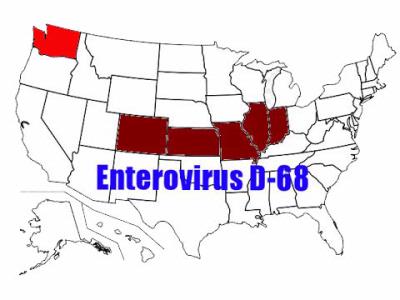
Enterovirus D-68 Confirmed in Two Patients at Childrens
Friday, September 19, 2014
 |
Seattle Children’s Hospital announced today that two children have tested positive for Enterovirus D-68 (EV-D68). The children, whose names were not released, have preexisting health conditions that exacerbated their condition but were stable enough to be discharged from the hospital earlier this week. The presence of EV-D68 in the two children was confirmed by the Centers for Disease Control (CDC) on Thursday. Results for three other children who were tested for EV-D68 were negative. Two of those children have been discharged; one is deceased. No children in Washington or the United States have died of EV-D68 related illness. “We understand that parents may be feeling anxious after hearing this news,” said Dr. Danielle Zerr, Division Chief, Pediatric Infectious Disease at Seattle Children’s Hospital. “Parents should watch their children closely for difficulty breathing and wheezing, especially in kids with asthma. If your child does not have these symptoms, then you do not need to seek hospital care. If your child is exhibiting these symptoms, take them to the emergency room as soon as possible. If your child is in severe respiratory distress, call 911.” Enteroviruses are very common viruses; there are more than 100 types. It is estimated that 10 to 15 million people get enterovirus infections in the United States each year. Most people infected with enteroviruses have only mild symptoms or none at all, and don’t need to see a medical professional. But some infections can be serious and do require medical evaluation. EV-D68 is less common than other enteroviruses. Compared with other enteroviruses, EV-D68 has been rarely reported in the United States for the last 40 years, according to the Washington State Department of Health. “Confirmation of these cases indicates that EV-D68 is likely in our communities and that we can expect to see additional cases over the coming weeks,”said Dr. Jeff Duchin, Chief of Communicable Disease and Epidemiology at Public Health - Seattle & King County. “But we can’t predict at this time how severe or how long an EV-D68 outbreak might be locally.” Seattle Children’s is following recommended infection control protocols consistent with recommendations from the CDC, including putting patients with respiratory infections in isolation and encouraging all patients and patient families who are at the hospital to wash their hands before and after departing. For any hospitalized patients who test positive for rhinovirus or enterovirus, Seattle Children’s will continue to work closely with Public Health-Seattle and King County to determine if EV-D68 testing is needed. This week, the Washington State Department of Health and Public Health – Seattle & King County began distributing information to child care programs, schools, and community organizations explaining symptoms and advising what to do to prevent the spread of EV-D68. “Our hearts are with the children who have fallen ill from EV-D68 and their families,” said State Health Officer Dr. Kathy Lofy. “Because there is no vaccine for this illness, the best way to prevent it is to take precautions such as hand-washing and staying away from people who are sick.” Seattle Children’s, the Washington State Department of Health and Public Health – Seattle & King County offer the following tips to avoid contracting an EV-D68 infection: • Wash your own and your child’s hands often with soap and warm water (there is some evidence that hand washing is better than alcohol hand sanitizers at killing enteroviruses). Wash for at least 20 seconds. Children should sing their ABCs twice in a row while washing their hands to ensure the proper length of time.
• Avoid touching your eyes, nose and mouth with unwashed hands, and remind children to keep their hands away from their face to avoid touching their eyes, nose or mouth.
• Clean surfaces often, including toys, doorknobs, phone receivers and keyboards.
• Avoid kissing, hugging, and sharing cups or eating utensils with people who are sick.
• Disinfect frequently touched surfaces, such as toys and doorknobs, especially if someone is sick.
• If fever is present, stay home while sick and for at least one day after the fever is gone, without the use of fever-reducing medicines.
• Asthma management is particularly important at this time of year. Ensure your child is taking the appropriate medications as prescribed by your child’s doctor.
• Seek medical help right away if a child with asthma has trouble breathing or if worsening respiratory symptoms do not improve as expected with their usual medicines. If your child is in severe respiratory distress, call 911.